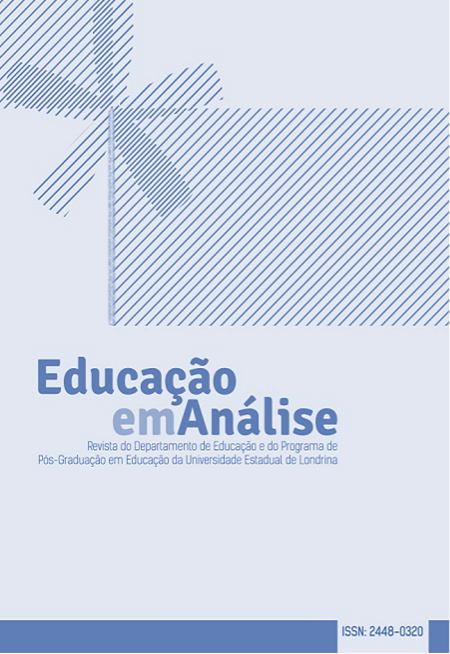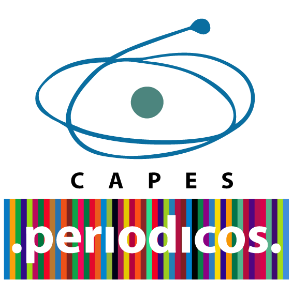Tradução e adaptação do learning and study strategies inventory - lassi 3ª edição para uso no brasil: considerações metodológicas
DOI:
https://doi.org/10.5433/1984-7939.2019v4n1p7Keywords:
Self-regulated learning, University student, Psycho-educational assessment, Learning strategiesAbstract
Self-regulation involves students' awareness and control of their cognitive and metacognitive processes, as well as of their motivation, emotions, and behavior. Although the theme of self-regulated learning has attracted the interest of Brazilian researchers, the production of knowledge and its necessary application in the educational context is still incipient. The concern with developing and using more valid and reliable instruments for measurement of the variables associated to self-regulated learning in a more integrated way has also been a recent issue in Brazil. Thus, the present study is part of a larger interinstitutional cooperation research, funded by the National Council for Scientific and Technological Development (CNPq), which seeks to understand the cognitive, metacognitive, affective and motivational factors associated with academic success in university. Its objective is to report the methodological procedures related to the translation of the Learning and Study Strategies Inventory (LASSI), the version for college students (3rd edition) developed by Weinstein, Palmer and Acee (2016), as a first step for future validation studies for its use in the Brazilian context. The aim is to contribute to the advancement of knowledge on the measurement of psychological variables associated with learning and academic success in a more integrated, valid and reliable manner.Downloads
References
BARTALO, Linete. Mensuração de estratégias de estudo e aprendizagem de alunos universitários: Learning and study strategies inventory (LASSI) adaptação e validação para o Brasil. 2006. Thesis (Doctorate in Education) - Universidade Estadual Paulista "Júlio de Mesquita Filho", Marília, 2006.
BARTALO, Linete; GUIMARÃES, Sueli Édi Rufini. Estratégias de estudo e aprendizagem de alunos universitários: um estudo exploratório. Informação e Informação, Londrina, v. 13, n. 2, 2008. Available in: http://www.uel.br/revistas/uel/index.php/informacao/article/view/1828. Access in: 15 dez.2018.
BEMBENUTTY, Hefer. New directions for self-regulation of learning in postsecondary education. New Directions for teaching and Learning, v. 126, 2011. Available in: https://onlinelibrary.wiley.com/doi/abs/10.1002/tl.450. Access in: 12 nov. 2018.
BORSA, Juliane Callegaro; DAMÁSIO, Bruno Figueiredo; BANDEIRA, Denise Ruschel. Adaptação e validação de instrumentos psicológicos entre culturas. Paidéia, Ribeirão Preto, v. 22, n. 53, 2012. Available in: http://www.scielo.br/scielo.php?script=sci_arttext&pid=S0103-863X2012000300014. Access in: 04 nov. 2018.
BORUCHOVITCH, Evely. Aprender a aprender: Propostas de intervenção em estratégias de aprendizagem. Educação Temática Digital, Campinas, v. 8, n.2, 2007. Available in: https://periodicos.sbu.unicamp.br/ojs/index.php/etd/article/view/651. Access in: 03 nov. 2018.
BORUCHOVITCH, Evely. Autorregulação da aprendizagem: contribuições da Psicologia Educacional a formação de professores. Psicologia Escolar e Educacional, São Paulo, v. 18, n. 3, 2014. Available in: http://www.scielo.br/pdf/pee/v18n3/1413-8557-pee-18-03-0401.pdf. Access in: 07 nov. 2018.
BORUCHOVITCH, Evely. Avaliação psicoeducacional: desenvolvimento de instrumentos à luz da Psicologia Cognitiva baseada na Teoria do Processamento da Informação. Avaliação Psicológica, Campinas, v. 5, n. 2, 2006. Available in: http://pepsic.bvsalud.org/scielo.php?script=sci_abstract&pid=S1677-04712006000200004. Access in: 10 nov. 2018.
BORUCHOVITCH, Evely; GANDA, Danielle Ribeiro. Fostering self-regulated skills in an Educational Psychology course for Brazilian preservice teachers. Journal of Cognitive Education and Psychology, v. 12, n. 2, p. 157-177, 2013.
BORUCHOVITCH, Evely; SANTOS, Acácia Aparecida Angeli dos. Psychometric studies of the learning strategies scale for university students. Paidéia, Ribeirão Preto, v. 25, n. 60, 2015. Available in: http://www.scielo.br/scielo.php?script=sci_arttext&pid=S0103-863X2015000100019. Access in: 01 nov. 2018.
DEMBO, Myron H. Applying educational psychology. 5ª ed. New York: Longman, 1994.
INEP. Resumo técnico: Censo da Educação Superior, 2018.
MEGA, Carolina; RONCONI, Lucia; BENI, Rossana de. What makes a good student? How emotions, self-regulated learning and motivation contribute to academic acheievement? Journal of Educational Psychology, v. 106, n. 1, 2013. Available in: https://www.researchgate.net/publication/263916847_What_Makes_a_Good_Student_How_Emotions_Self-Regulated_Learning_and_Motivation_Contribute_to_Academic_Achievement. Access in: 13 nov. 2018.
PRESSLEY, Michael; BORKOWSKI, John; SCHNEIDER, Wolfgang. Good information processing: What it is and how education can promote it. Journal of Educational Research, v. 13, n. 8, 1989. Available in: https://www.sciencedirect.com/science/article/pii/0883035589900694. Access in: 28 oct. 2018.
VIJVER, Fons Van de; HAMBLETON, Ronald. Translating tests: some practical guidelines. European Psychologist, v. 1, n. 2, 1996. Available in: https://www.researchgate.net/publication/232562063_Translating_Tests_Some_Practical_Guidelines. Access in: 25 oct. 2018.
WEINSTEIN, Claire Ellen; ACEE Taylor W. Study and Learning Strategies. Handbook of College Reading and Study Strategy Research. 2.ed. Routledge, 2018.
WEINSTEIN, Claire Ellen; PALMER, David; ACEE, Taylor W. LASSI - Learning and Study Strategies Inventory. 3.ed. Clearwater, FL: H&H Publishing Company, Inc, 2016.
ZIMMERMAN, Barry. Dimensions of academic self-regulation: a conceptual framework for education. In: SCHUNK, Dale; ZIMMERMAN, B. Self-regulation of learning and performance. Issues and educational applications. Hillsdale, NJ: Erlbaum, 1994.
ZIMMERMAN, Barry; SCHUNK, Dale. Handbook of self-regulation of learning and performance. New York, NY: Taylor & Francis, 2011.
Downloads
Published
How to Cite
Issue
Section
License
Copyright (c) 2019 Educação em Análise

This work is licensed under a Creative Commons Attribution 4.0 International License.
Os artigos publicados na Revista Educação em Análise estão sob a Licença Creative Commons Atribuição 4.0 Internacional, garantindo Acesso Aberto. Deste modo, os autores mantêm os direitos autorais de seus trabalhos e, em caso de republicação, solicita-se que indiquem a primeira publicação nesta revista. Essa licença permite que qualquer pessoa leia, baixe, copie e compartilhe o conteúdo, desde que a devida citação seja feita. Além disso, autoriza a redistribuição, adaptação e criação de obras derivadas em qualquer formato ou meio, incluindo uso comercial, desde que a atribuição à revista seja mantida.
A revista se reserva o direito de efetuar, nos originais, alterações de ordem normativa, ortográfica e gramatical, com vistas a manter o padrão culto da língua e a credibilidade do veículo. Respeitará, no entanto, o estilo de escrever dos autores. Alterações, correções ou sugestões de ordem conceitual serão encaminhadas aos autores, quando necessário.
As opiniões emitidas pelos autores dos artigos são de sua exclusiva responsabilidade.
























